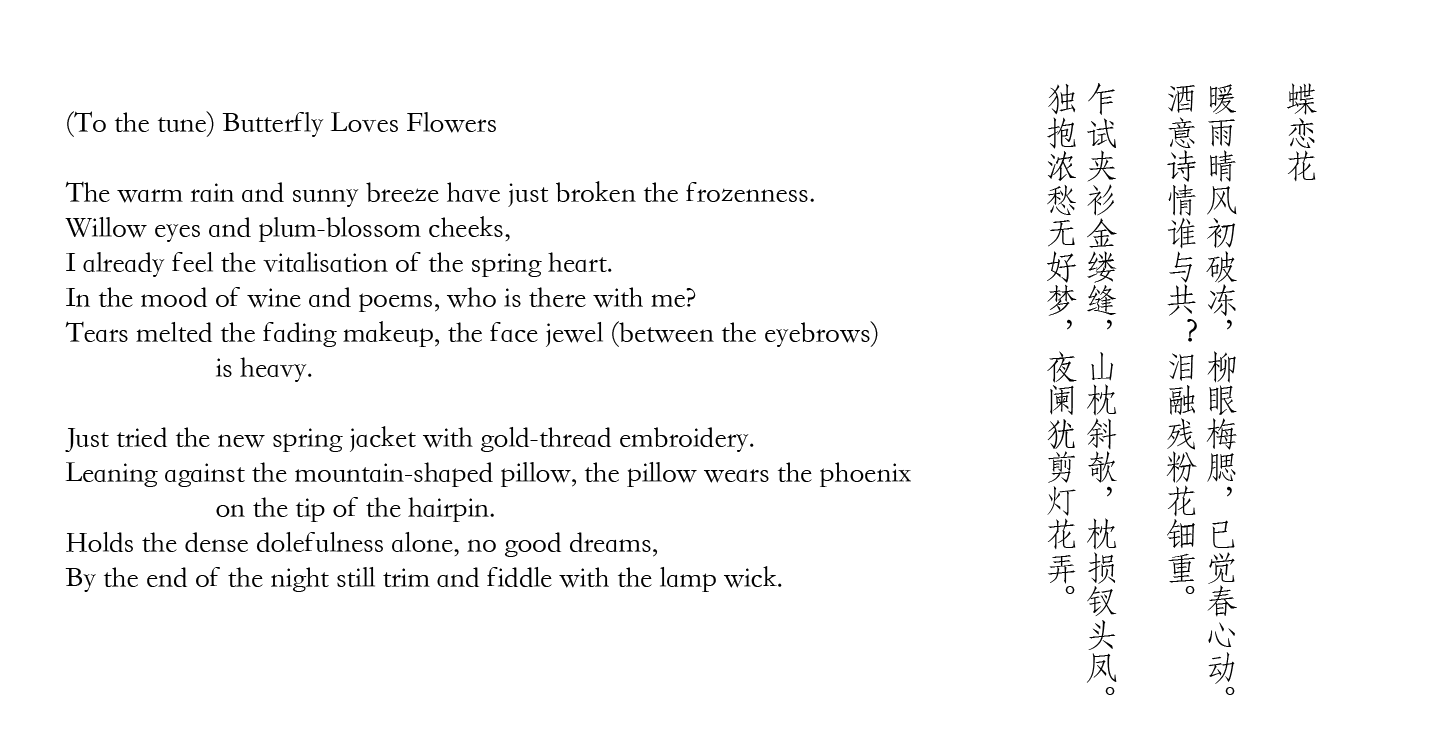
Keywords: Thermal, affect, emotion, translation, cross-cultural, lexicon, design, framework, multisensory
Smiles Summon theWarmth of Spring: A Framework for Thermal and Affective Design Grounded in Classical Chinese Poetry
Publish as DIS 2024 proceedings. Click to see the preprint paper.
Abstract
Thermal-affective experience is a growing topic in Human-Computer Interaction. However, research linking thermal and affective experience in technology use has not moved beyond attempts to establish broad, sweeping associations, such as between warmth and positive affect. One of the obstacles to progression is the need for frameworks and vocabularies that describe and conceptualise the richness of thermal perception and affective experience. To help conceptualise associations between thermal perception and affective experience we turn to Cí poetry, a form of classical Chinese literature rich with evocative descriptions of embodied, environmentally situated, first-person experience. We conducted a lexical analysis to identify thermal-affective associations, and propose a design framework addressing thermal design. We demonstrate the value of this framework via analysis of existing thermal design exemplars.

Language for articulating and designing experience
Everyday sensory experience is rich and varied - a source of comfort and discomfort, satisfaction and meaning. If we want to design multisensory interfaces which create meaningful sensory and affective experiences we need a language to describe those experiences.
The language of technical implementation is not enough. Sensors and actuators encourage a language of magnitudes and intensities, and simple mappings to emotion words.
happy = hot, sad = cold!
In real-world contexts, these simple mappings quickly break down.
Our thermal experiences are influenced not only by intensity of heat on our skin, but by other sensory qualities, the context and our bodily and emotional state. And all this influences the relationship between sensory experience and mood. It gets very complex very quickly!
The question
So how can we bridge between technology design and complex experience? How can designers communicate and specify their designs, and help users to describe their preferences and experiences?
Chinese poetry - Cí
That may sound strange at first, but poets are true experts in describing experience and emotion. In particular Cí poetry from the Song dynasty is renowned for evocative accounts of embodied, environmentally-situated, experience
A masterclass in conveying experience!

Who’s poetry?
We drew on poetry by two famed Cí poets: 李清照 Lǐ Qīng Zhào and 苏轼 Sū Shì.
We conducted a lexical analysis of 154 poems by these authors to identify a vocabulary and high level principles for designing and communicating thermal-affective experience.
For example, we found that thermal experiences were very often multisensory, sometimes even expressed without reference to the haptic modality. People also perceive agency in thermal cues. They can be experienced as dominant, aggressive, passive or active.
Thermal cues also have different temporal and material qualities. For example “Wen” (温) describes an enveloping, flowing warmth, while “nuan” (暖) conveys radiant warmth. These can feel quite different and have different emotional associations.

This is just a small part of our findings! The paper contains much more, alongside evocative examples which designers can draw upon for inspiration!
Towards design theories
We connect these results to the needs of interaction design, creating a framework to guide thermal affective design. This provides vocabulary and guiding principles to help designers navigate the complex multisensory landscape of thermal-affective experience.
We demonstrate the usefulness of the framework by applying it to analyse existing research. We show how the patterns of vocabulary and design concepts bring clarity to analysis, expand design spaces, and support ideation.
Thanks for reading! I’m so excited and proud about this paper. It was a huge amount of work, to translate and analyse these poems even before we developed the framework, but very rewarding! Thanks to my co-authors Dr Dan Bennett (@comic-sans-soleil.bsky.social) and Dr Elisa Mekler (@elisamekler.bsky.social)